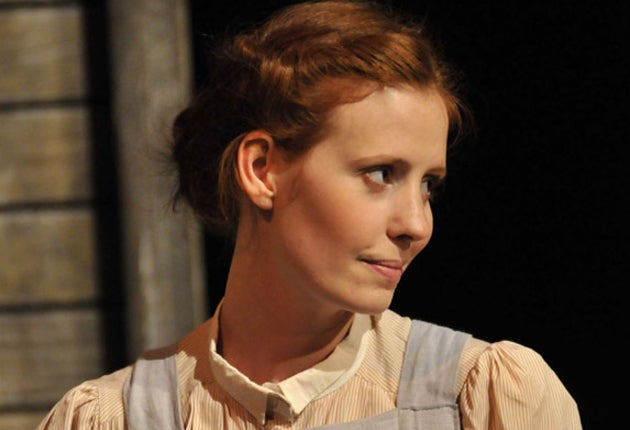The Hired Man, Octagon Theatre, Bolton
A pastoral musical to Bragg about

He's the nation's favourite composer, according to Classic FM, and one of its most prolific creative voices.
There's hardly anyone who couldn't recognise one of Howard Goodall's themes for TV and films, including Blackadder and The Vicar of Dibley. While his latest musical, Love Story, is causing a run on paper tissues in Chichester, The Hired Man is holding audiences spellbound in Bolton.
In collaboration with director David Thacker and Melvyn Bragg, on whose Cumbrian upbringing the book is based, Goodall has revisited the score of The Hired Man, adapting the music in tandem with Thacker and Bragg's pruning of the narrative. Composed when Goodall was just 26, the score is ambitious in the way it combines an English country folk idiom with slightly more original material, resourceful in its colourful use of a pianist and the instrumental skills of a versatile ensemble cast, and affecting in its irresistible humanity.
You can see why, in 1984, when The Hired Man was running in the West End, it attracted several awards and was voted Best Musical of the Year. A soap-opera style saga, it's almost easier to list what doesn't happen here than what does, since Bragg invested so much of the Cumbrian love, life and death he knew or imagined into his novel and, subsequently, this musical. Spanning several decades, the story encompasses the lives of the Tallentire brothers, focusing on John (a robust Kieran Hill) and his feisty wife, Emily (Amy Nuttall), combining the private and public passions of people for whom life was never anything but tough. As well as lacking a powerful stand-out song, it's odd that the "Song of the Hired Men" – land labourers who have accepted that life is anything but a bed of roses – is such a robust chorus shot through with apparent optimism.
In the Octagon's enthusiastic production the music seems to unfold in step with the rolling narrative in an impressively vivid account by the two dozen or so company members and extras. Despite its limitations in terms of emotional richness and musical sophistication in comparison with Goodall's more recent scores, the music is allusive, yearning in its pastoral pastiche, edgier in the darker moments and always easy on the ear.
Thacker's fast-paced production – moving setting and characters deftly on from barren farmland to the treacherous Whitehaven mines and the explosive trenches of the First World War – invests the simple narrative with a kaleidoscopic shifting of moods. Dawn Allsopp's multi-layered, wood-slatted set provides an effective backdrop. If Nuttall's Emily, ageing through unrequited passion, political awakening and family loss, is more convincing here as an actress than a singer, Barbara Hockaday, as her daughter, and Clara Darcy as her trumpet-playing friend Sally both display clear voices. John Cusworth provides an altogether engaging love interest. The cast as a whole, held together under Carol Sloman's vigorous musical direction, show a real feel for Goodall's idiom in some striking choruses and a variety of cameo roles. Some clunky dialogue apart, the show makes a positive statement about people existing at the mercy of their circumstances yet somehow, we're left hoping, triumphing over them.
To 3 July (01204 520661)
Subscribe to Independent Premium to bookmark this article
Want to bookmark your favourite articles and stories to read or reference later? Start your Independent Premium subscription today.

Join our commenting forum
Join thought-provoking conversations, follow other Independent readers and see their replies